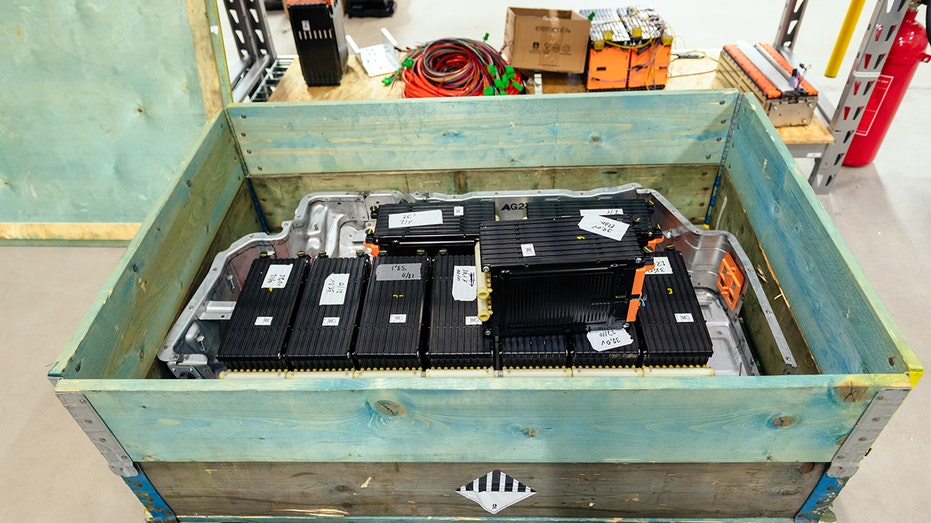Pair of South Korean EV battery makers seek to overturn ITC ruling against Georgia factory
Companies accused of destroying evidence, stealing trade secrets on lithium-ion battery production, WSJ reports
A pair of South Korean battery makers made their pitches to the Biden administration about a disputed factory project under construction in Georgia seen as key to the electric-car plans of Ford Motor Co. and Volkswagen AG.
| Ticker | Security | Last | Change | Change % |
|---|---|---|---|---|
| F | FORD MOTOR CO. | 13.59 | -0.21 | -1.52% |
| 096770 | NO DATA AVAILABLE | - | - | - |
| 051910 | NO DATA AVAILABLE | - | - | - |
SK Innovation Co. is looking for the White House to overturn a ruling by a federal trade commission last month that the company said would cause it to abandon a $2.6 billion battery factory complex it had hoped to open later this year, according to a copy of a presentation made to officials last week and reviewed by The Wall Street Journal.
The new complex, located northeast of Atlanta in Commerce, Ga., is expected to create 2,600 jobs and supply electric-car batteries to Ford and Volkswagen, SKI has said.
SHIFT TO ELECTRIC VEHICLES SPURS BID TO MAKE MORE BATTERIES IN US
In the presentation given to administration officials, SKI also disclosed previously unreported plans to expand the factory complex by investing another $2.4 billion in the project and creating an additional 3,400 jobs by 2025.
Meanwhile, representatives of LG Chem met with administration trade officials Friday to make their pitch for preserving the ruling, according to people familiar with the discussion.
Nearly two years ago, rival battery maker LG Chem filed a complaint with the U.S. International Trade Commission accusing SKI of stealing trade secrets relating to lithium-ion battery production. SKI has denied the allegations.

A pair of South Korean battery makers made their pitches to the Biden administration about a disputed factory project under construction in Georgia seen as key to the electric-car plans of Ford Motor Co. and Volkswagen AG. Photographer: Mikael Sjober
The ITC — an independent government agency — in a Feb. 10 ruling upheld an earlier judge’s determination that SKI had destroyed evidence relating to the case. The ruling prohibited SKI from importing batteries and other components needed to support the U.S. factory production for a decade, disrupting its plans to bring the complex online.
The commission ruled that SKI in the meantime could support its existing contracts with Ford and VW for four and two years, respectively, to give those companies time to find another battery supplier.
The ruling started the clock on a 60-day review period in which the decision could be overruled by the White House on policy grounds. While rare, such a reversal has precedent. LG Chem’s stance is that it can increase its U.S. battery-making capacity to accommodate Ford and VW during the period in which SKI is banned from importing components, according to the people familiar with talks between the company and the administration. LG Chem is also open to accepting financial restitution from SKI to settle the matter, they said.
A spokesman for the Office of the U.S. Trade Representative declined to comment on discussions with the two battery makers.
GET FOX BUSINESS ON THE GO BY CLICKING HERE
The legal fight between two of the world’s largest battery makers highlights the high stakes that auto makers face in securing batteries and meeting growth targets for electric vehicles. Tightening restrictions on tailpipe emissions and commitments by some governments to phase out gas-powered vehicles in the coming decades are pressuring auto makers to sell more battery-powered cars or face the prospect of steep fines.
The spat touches on several of President Biden’s policy priorities: fighting climate change by transitioning the transportation sector to electric vehicles, creating jobs and building up domestic production capacity for batteries to reduce dependence on manufacturers abroad.
On Wednesday, the Biden administration ordered a 100-day review of electric vehicle battery supply chains as well as those for semiconductor chips, pharmaceuticals and rare-earth minerals with the aim of spurring the U.S. industry.
South Korean Prime Minister Chung Sye-kyun on Jan. 28 said the dispute was embarrassing and that he had spoken with the heads of both companies pressing them to resolve the matter.
After the ITC’s ruling, Ford Chief Executive Jim Farley said in a tweet that a settlement between the two companies would be in the best interests of U.S. manufacturers and workers.
Both Ford and VW told the ITC last year that sanctions against the SKI plant could significantly hinder their efforts to build electric vehicles in the U.S.
CLICK HERE TO READ MORE ON FOX BUSINESS
SKI is set to provide Ford with batteries for an electric version of its bestselling F-150 pickup truck, which is expected to launch next year, while VW plans to start building its ID.4 crossover in Tennessee in 2022, with batteries supplied from SKI, the auto makers have said.
The SKI presentation to administration officials said the ITC’s judgment was based on the destruction of evidence and not a finding of trade-secret theft. It also highlighted other SK Group investments in U.S.-related businesses, such as last year’s $9 billion acquisition of Intel Corp.’s flash-memory manufacturing business by SK Hynix Inc., another SK subsidiary.
Presidents have intervened in ITC rulings before. The Obama administration in 2013 overruled a decision to ban Apple Inc. from importing certain iPhones and iPads after a case filed by Samsung Electronics Co. alleged they infringed on a patent held by the Korean electronics maker. The Obama administration said its decision was informed in part by concerns about potential harms to consumers and competitive conditions in the U.S.




















